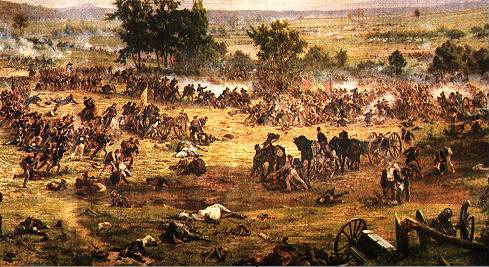
| View of "Pickett's Charge" from the Union lines at Gettysburg on July 3, 1863. Image taken from the Gettysburg cyclorama at the Gettysburg National Historical Battlefield Park website. |  |
1. To what extent do you think it is proper
for political considerations to determine the shape of military operations
and strategy? Is it ever proper for military considerations to constrain
political ones, and if so, to what extent? What impact do you think modern
communications has had/should have on this relationship? Are some factors
(for example: technological limits, comparative advantages, the reputation
of an ally, or the need to manage public perceptions) more important constraints
than others? Is the dynamic different for total wars than for limited wars?
2. What is your assessment of US strategy
in World War II? Do you find the logic behind the "Europe first" approach
and Operation TORCH persuasive? Were the Allies right to mount a second
amphibious assault on France (Operation DRAGOON) instead of launching a
drive through the Balkans to prevent the Soviets from overrunning Eastern
Europe? To what extent is the success of Allied strategy via the Combined
Chiefs of Staff system a product of its unique mix of civilian and military
decision-makers and to what extent was success hampered by it?
3. Do you find Krepinevich's or Summers'
assessment of US strategy in Vietnam more persuasive? Was the US military
making a strategy out of tactics as Krepinevich asserts, and if so, what
should have been done differently? Assuming that Vietnam was best addressed
as a counter-insurgency campaign, to what extent should the military have
abandoned some of its previous core competencies to develop new ones given
the geo-political situation at the time? Do you agree with Summers use
of Clausewitz? If the US military was constrained from striking the enemy's
center of gravity, should the US president have been told to amend his
goals or choose another war to fight?
4. Did the US-lead coalition stop at, near, far from, before, or after the culminating point of victory in the 1991 Gulf War? Do different actions in the final stages of the war point to the same or different positions on a "culminating point of victory curve"? Was the US command authority premature in ending the ground war, and if so was McCaffrey's post-cease fire engagement and the incidents around Safwan a needed corrective? Was General Frank's direction of VII Corps prudent or overly cautious according to your understanding of the culminating point of victory?